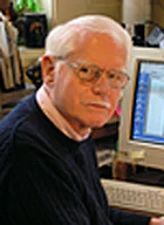James W. Head

The 2010 Runcorn-Florensky Medal is awarded to James W. Head for his outstanding work in studying volcanism and tectonism in the formation and evolution of planetary crusts and for developing remarkable US-European research collaborations in Earth and planetary sciences.
Jim Head is the Louis and Elizabeth Scherck Distinguished Professor of Geological Sciences. He came to Brown University in 1973, following his work with the NASA Apollo program, in which he analysed potential landing sites, studied returned lunar samples and data, and provided training for the Apollo astronauts. His current research centres on the study of the processes that form and modify the surfaces, crusts and lithospheres of planets, how these processes vary with time and how such processes interact to produce the historical record preserved on the planets. Comparative planetology, the themes of planetary evolution and application of these to the study of early Earth history are also of interest. He has followed up his research on volcanism, tectonism and glaciation with field studies on active volcanoes in Hawaii and at Mount St. Helens, on volcanic deposits on the sea floor with two deep sea submersible dives and during two field seasons in the Antarctic Dry Valleys.
Several research projects are under way in the field in Antarctica, on the Earth’s sea floor, and in assessing data from planetary surfaces to study climate change on Mars, volcanism on the Moon, Mars and Venus, the geology of the surface of Mercury and the tectonic and volcanic evolution of icy satellites. Since 1984, Head convenes the Vernadsky Institute/Brown University microsymposia, held twice a year in Moscow and Houston. He has served as Co-investigator in NASA and Russian Space Missions, such as the Soviet Venera 15/16 and Phobos missions, and the US Magellan (Venus), Galileo (Jupiter), Mars Surveyor, the Russian Mars 1996 and Space Shuttle missions. Head is presently a co-investigator for the NASA MESSENGER mission to Mercury and Moon Mineralogy Mapper (M3), as well as the European Space Agency’s Mars Express mission.
He has supervised a large number of Ph.D. students who have subsequently followed prestigious careers. He has published more than 430 refereed articles. He has received numerous prizes for his research activities and publications and has played a leading role in the development of collaborative planetary research between the US and Europe (West and East).
